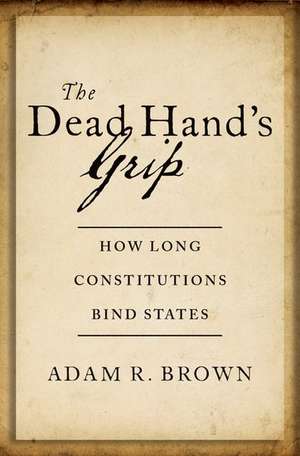The Dead Hand's Grip: How Long Constitutions Bind States
Autor Adam R. Brownen Limba Engleză Hardback – 18 noi 2022
Preț: 490.67 lei
Preț vechi: 543.97 lei
-10% Nou
Puncte Express: 736
Preț estimativ în valută:
93.92€ • 102.05$ • 78.94£
93.92€ • 102.05$ • 78.94£
Carte disponibilă
Livrare economică 20-26 martie
Preluare comenzi: 021 569.72.76
Specificații
ISBN-13: 9780197655283
ISBN-10: 0197655289
Pagini: 192
Ilustrații: 17 b/w line drawings; 20 tables
Dimensiuni: 238 x 162 x 18 mm
Greutate: 0.44 kg
Editura: Oxford University Press
Colecția OUP USA
Locul publicării:New York, United States
ISBN-10: 0197655289
Pagini: 192
Ilustrații: 17 b/w line drawings; 20 tables
Dimensiuni: 238 x 162 x 18 mm
Greutate: 0.44 kg
Editura: Oxford University Press
Colecția OUP USA
Locul publicării:New York, United States
Recenzii
Adam Brown's The Dead Hand's Grip provides a good introduction to variations in state constitutions and the broad impact of these documents in the states.
Relying on sophisticated statistical analysis of Americas state constitutions,The Dead Hands Gripmakes a helpful contribution to debates about the consequences of constitutional design, by showing that a constitutions length and specificity have important effects on governance and that longer, more detailed constitutions, often written in the 19thcentury, limit policy-makers flexibility and reduce states' performance on various economic measures in the 21stcentury.
The Dead Hands Grip is a remarkable achievement in comparative analysis. By comparing the length of the constitutions of the 50 US states, Brown is able to control for a variety of social, economic, and cultural confounders that typically frustrate our ability to measure the effects of constitutions. Using time-series analysis, Brown shows that longer constitutions lead to more amendments, more judicial invalidations, and worse economic outcomes in terms of GDP per capita, unemployment, inequality, and innovation. Methodological precision, and a series of robustness checks make his results extremely persuasive. This is a landmark work in the study of constitutions.
Adam Brown presents deep research and strong statistical evidence of the negative effects in states with overly specific (and therefore long) constitutions. This issue has vexed scholars for years, and his book sets the terms of the debate for years to come.
Adam Brown offers an important book on American constitutionalism. In The Dead Hands Grip, Brown shows how detailed state constitutions restrain state lawmakers from responding to pressing social, economic, and political issues. Lawmakers often bridle against these restraints, clashing with state judges and passing new amendments, further constitutionalizing mundane policy issues. This over-specificity prevents lawmakers from securing socioeconomic goods. Using statistical analysis and wide-ranging examples, Brown convincingly demonstrates that constitutional specificity harms democratic legitimacy and policymaking.
This slim volume is a provocative examination of the challenges presented by specificity in US state constitutions...The methodological approaches are carefully explained and defended throughout the book. This look at state constitutions creates an interesting examination of the political systems operating in the American states.
Relying on sophisticated statistical analysis of Americas state constitutions,The Dead Hands Gripmakes a helpful contribution to debates about the consequences of constitutional design, by showing that a constitutions length and specificity have important effects on governance and that longer, more detailed constitutions, often written in the 19thcentury, limit policy-makers flexibility and reduce states' performance on various economic measures in the 21stcentury.
The Dead Hands Grip is a remarkable achievement in comparative analysis. By comparing the length of the constitutions of the 50 US states, Brown is able to control for a variety of social, economic, and cultural confounders that typically frustrate our ability to measure the effects of constitutions. Using time-series analysis, Brown shows that longer constitutions lead to more amendments, more judicial invalidations, and worse economic outcomes in terms of GDP per capita, unemployment, inequality, and innovation. Methodological precision, and a series of robustness checks make his results extremely persuasive. This is a landmark work in the study of constitutions.
Adam Brown presents deep research and strong statistical evidence of the negative effects in states with overly specific (and therefore long) constitutions. This issue has vexed scholars for years, and his book sets the terms of the debate for years to come.
Adam Brown offers an important book on American constitutionalism. In The Dead Hands Grip, Brown shows how detailed state constitutions restrain state lawmakers from responding to pressing social, economic, and political issues. Lawmakers often bridle against these restraints, clashing with state judges and passing new amendments, further constitutionalizing mundane policy issues. This over-specificity prevents lawmakers from securing socioeconomic goods. Using statistical analysis and wide-ranging examples, Brown convincingly demonstrates that constitutional specificity harms democratic legitimacy and policymaking.
This slim volume is a provocative examination of the challenges presented by specificity in US state constitutions...The methodological approaches are carefully explained and defended throughout the book. This look at state constitutions creates an interesting examination of the political systems operating in the American states.
Notă biografică
Adam Brown is an associate professor of political science at Brigham Young University and a faculty scholar at BYU's Center for the Study of Elections and Democracy. His research examining people and political institutions in the American states has appeared in the Journal of Politics, Political Behavior, State Politics and Policy Quarterly, and elsewhere. He is also the author of the only scholarly analysis of Utah politics, which contributed to his receipt of the Mollie and Karl Butler Young Scholar Award from the Charles Redd Center for Western Studies in 2018. He received his PhD from the University of California, San Diego, in 2008.
